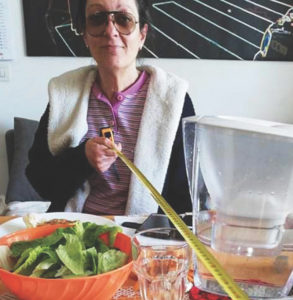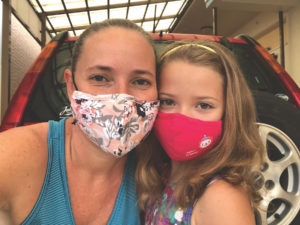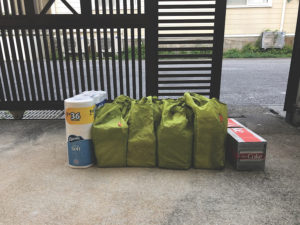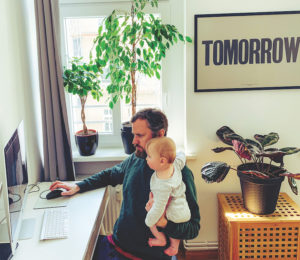During the COVID-19 pandemic, we have truly become, despite all the fear and barriers, a global family. Near or far, we are facing the same risks and many of the same restrictions. No one knows for sure what lies ahead. Many of us here are thinking of our loved ones on distant shores.
The Independent has sent out a call to people who have a connection to the Outer Cape asking what their situations are like. On this page and in issues to come, we will report some of their stories. We hope to learn from one another how to help weather the enormous challenges ahead.
Milan, Italy

Jenny De Cicco met Wellfleet artist Julia Salinger during Salinger’s residency in Italy, and ever since she has dreamed of visiting Cape Cod. Raised in Otranto, in the Puglia region of southern Italy, De Cicco has lived with her mother, Maria Teresa, in Milan, an epicenter of the pandemic, since 2017.
“The COVID-19 crisis arrived during the Milano fashion week,” says De Cicco, who worked in a restaurant. “People started to cancel their reservations in hotels, and restaurants, gyms, pubs, and clubs closed. Now I’m locked into my apartment with my mother, with no certainty of being able to work anytime soon again.”
How has she learned to cope with this crisis? “I live day by day,” she says. “I wake up in the morning, try to call and write to my new and old friends. And I also started writing and drawing like in the past, trying to get back in touch with myself.”
De Cicco feels that this crisis, terrible as it is, holds hope for humanity. “This could be an amazing reboot for our future,” she says. “We are now shown that we are also insignificant if we only think like individuals and act unscrupulously. We are all a small part of something much bigger.”
Okinawa, Japan

Becky Saunders’s mother grew up in Provincetown, and she herself summered here throughout her childhood. She, her husband, and their eight-year-old daughter are a Marine Corps family, and after living in six different locations on three continents, they are now based on the Japanese island of Okinawa. Four years ago, during a seasonal migration to Provincetown, Saunders opened a children’s travel store, Sidekicks, at 368A Commercial St. Creating a foothold in Provincetown, she says, “gave our daughter a constant touchpoint, regardless of where we were living — the same location, the same people, the same rhythm. Despite that fact that I didn’t actually grow up in Provincetown, it’s where I get homesick for, where I long to return to.”
Saunders and her family returned to the U.S. on Feb. 17. At that point, the coronavirus had already hit Asia. “All our flights were on schedule,” she says. “There was no additional paperwork, no thermal scan or temperature taken, no acknowledgment that anything was different.”

They were in Provincetown when COVID-19 was first diagnosed in the U.S. On March 12, they went to California for a few days to visit family, and, she says, “It seemed like the world had flipped upside down.” They were surprised to find that their flight back to Japan was not canceled. “While in the air between San Francisco and Tokyo, a flight attendant told us that San Francisco had just gone into lockdown,” she says.
When they entered Japan on March 16, they were put into 14 days of Restriction of Movement (ROM, or self-quarantine). “As I write this,” she says, “we’re in ROM. There are no active COVID-19 cases on Okinawa, but with the uptick everywhere else in the world, it would be naïve to think our little sphere of isolation could last forever. Regardless of where we are, we’re all in this together and we will get through this together.”
Berlin, Germany

Alex Beer spent every summer of his childhood with his grandfather on the Cape. “Cape Cod has always felt like a childhood home to me,” he says. Beer now lives with his Russian wife, Irina, and their baby daughter, Mila, in Berlin, Germany. The biggest change to his daily life due to COVID-19 is that, since March 16, everybody in the small graphic design company where he is employed has been working from home. (Note: Beer is the writer’s younger brother.)
“Like many other small companies and start-ups in Berlin, we probably won’t be able to survive for very long under these economic circumstances,” Beer says. “When we come out the other end of this, I expect to find myself out of my current job.”
To get through these challenging times, Beer and his wife “try not to constantly check the news or the numbers,” he says. “I feel that by discussing the situation and sharing our thoughts, feelings, and worries, we won’t get stuck in our own heads. Mila, luckily, is too young to realize what is going on, although she probably senses the tension. Mila’s and my go-to coping mechanism is dancing to Bob Marley or Louis Armstrong wearing our woolly hats.”
The message Beer sends from Berlin: “Slowing down the spread of the virus is a community effort — everybody has to look out for their neighbors and make small everyday sacrifices to protect the vulnerable. I’ve always felt a great sense of community on the Cape.”
Reykjavík, Iceland

Hafthor Ragnarsson and his wife, Arnfridur, live in Reykjavík, the capital of Iceland. They are both government employees and have two daughters who are 10 and 20 years old. Their local connection is Arnfridur’s sister, Erla, who has lived on Cape Cod for the last decade with her husband and two daughters.
Since the COVID-19 crisis hit Iceland at the end of February, Hafthor and Arnfridur have experienced almost daily changes in their lives. “We barely go outside the house unless it is absolutely necessary,” Hafthor says. “All of our older daughter’s classes are now online. The younger one goes to school for three hours a day instead of six, and she is not allowed to meet with kids outside her class, not even in her free time. We are working from home one week and at our workplaces the alternate week. All of our leisure activities — singing in a choir, sports, and so on — have been canceled.”
The couple feels that most people in Iceland are aware of the need to be careful. “From the beginning, people have been tested,” Hafthor says. “That helps. And everybody in Iceland has access to health care, rich or poor. Healthy people are shopping for those in quarantine, and artists are streaming events for free.”
The Ragnarssons wish the people of Cape Cod well. “This is a situation unlike any we have known in our lifetime,” Hafthor says. “We are being shown how connected our world has become. Hopefully, it will get people thinking about what could be done differently in the future.”
